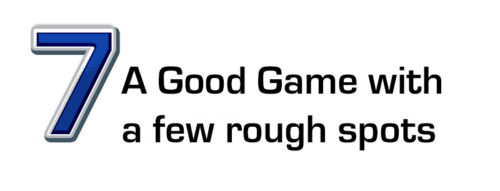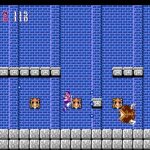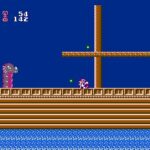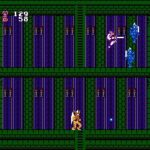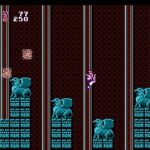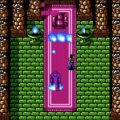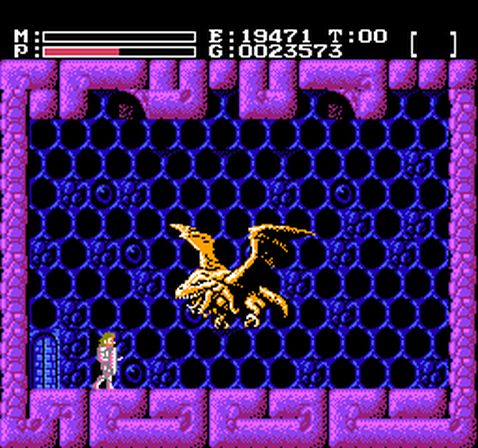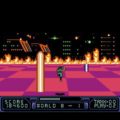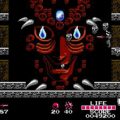Developer: Vik Tokai Publisher: Vik Tokai Release: 07/30/87 Genre: Action RPG
Zelda II was a departure from the gameplay that the original established. However in spite of its differences I loved that game, warts and all. I was always curious why there were so few games on the NES that were inspired by its gameplay. Little did I know that in Japan there were a number of similar titles, chief among them is Chester Field. Once scheduled for a US release it would have been released before Zelda II in the West. But Vik Tokai backed out for unknown reasons. It could not have been for quality reasons as Chester Field is a great game.
The kingdom of Guldred is in chaos after General Guemon assassinates King Guldred. A loyal knight named Gazem flees the country with the queen and her daughter Karen to Chester Field Island. But on the way Guemon’s forces catch up to them and murder the queen and kidnap Karen. Before he passes Gazem tells his tale to a knight named Kein who takes up the quest to restore the Guldred kingdom. The story is slight throughout the game and the plot revelations only come toward the end. For the most part Chester Field is playable in Japanese and only has a few sticking points. However there is a fan translation that while not the greatest makes the game accessible to everyone. In an odd bit of history Vik Tokai did release the game in English but only on the Commodore 64. How messed up is that?
Chester Field is a side scrolling action RPG that bears many similarities to Zelda II gameplay wise. Kein moves at a speedy clip and can upward stab. During the course of the game you can buy a few magic spells and gain a few new powers. These will allow him to jump higher, shoot fireballs from his sword and even fly. The controls can be a little stiff unfortunately but luckily the game has few instances of precision platforming. It simply means you will suffer cheap hits as Kein is unresponsive at times and slow to act.
Rather than an open world Chester Field has eight stages. Each stage has one or more residential areas housing shops and people who espouse information and a labyrinth. Unlike Zelda you can equip new weapons and armor and hold an inventory. Your primary weapon is the sword but you also must buy the mace to progress. With this you can destroy blocks, a skill that is called on frequently. The progression of each level is refreshing to a degree. Ordinarily you would assume that the labyrinth would lead to the end of the stage. But in most cases you can visit it as early as you want although it is more advantageous to save it for later. The stage only ends when you visit the elder who will allow you to move on. You can revisit prior stages although there is no real reason to.
Although there is a sizable overworld in each stage most of your time will be spent in the labyrinths. These dungeons are heavily reminiscent of Battle of Olympus in their design. They follow a simple room by room structure with each room divided into two levels. There are usually four exits which sounds simple. However they wrap around the map or even warp you to different parts of the dungeon altogether. This means map making is mandatory to get anywhere. They start large and only grow bigger as you progress too. Funnily enough once you know the critical path outside of two they are all actually pretty short. Learning that is what will trip players up.
While Chester Field is its own game it shares many of the same frustrations as Zelda II. The levels are full of breakable walls that hide shops and items. There are invisible floors that at first only set you back a short distance. Soon however they become mandatory for progress. Dead ends abound and the game is stingy with its hints, if they exist at all. Without spoiling anything there are a few points where specific items are necessary to kill bosses but the game does not tell you this. And the game’s finale requires you to gain certain powers in the last dungeon to kill the final boss. There is no indication of this and it feels unfair. These same criticisms are present in most NES action RPGs so I won’t harp on it too much. But it is best to consult a FAQ before jumping into this one.
Chester Field is not difficult so much as it is obtuse. It also frustrates in other areas. The game tries to limit its grinding by limiting character progression. You can only level up twice per stage so grinding out levels is not necessary. However new equipment shows up in every stage and while you can skip a few the increasing challenge will catch up with you. Midway the game introduces enemies that are more annoying than Iron Knuckles. Armor knights avoid attacks by jumping backwards repeatedly. In dungeons they are packed tight and inevitably leap on top of you. These cheap hits come quick and pile up. The last few stages are enough to tear your hair out as the regular enemies are more dangerous than the bosses. The spike comes out of left field and while aggravating at times does not ruin the game.
In Closing
I like Chester Field a lot. That should come as no surprise as Zelda II is one of my favorite NES games. Chester Field stands on its own despite its similarities to Nintendo’s game. I have no doubt it would have found an audience if it had left Japan. That is little impediment now however. NES fans looking for an action RPG should check this out.
